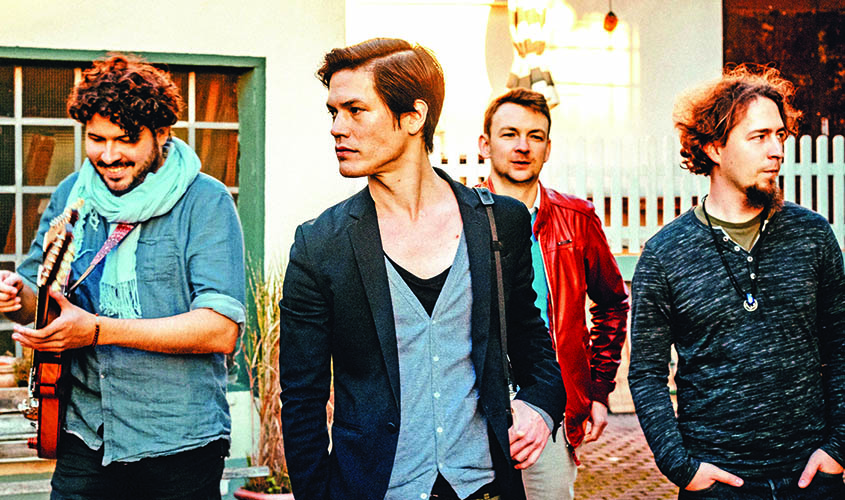The influence of rock, Indian and electronic music is evident in the compositions by the Frankfurt-based band Max Clouth Clan. Despite having their roots in jazz, the band is inspired by a multitude of styles and so goes beyond the usual genre-based categorisation.
The four-year-old musical outfit was recently in Delhi and performed tracks from their second and latest album Kamaloka at the Piano Man Jazz Club on 8 December. The four-member band from Germany comprises Max Clouth (vocalist), Markus Wach (contrabass player), Martin Standke (drummer) and Andrey Shabashev (pianist).
The album title, Kamaloka, is borrowed from Sanskrit—the word translates to “a place of desire”. Quite like their debut album, Return Flight, the new one evokes the feeling of embracing the world, with all the different cultures it houses, as one’s home. Every melody by the band emanates freshness, even if their musical foundations happen to be traditional.
Speaking to Guardian 20 about Kamaloka, frontman Max Clouth says, “With our recently released album we have tried to present a clever and lively songs that combine lightness and profound aspects. European and Indian stylistics, acoustic and electronic facets merge into a very personal and equally global sound for Kamaloka.”
The second album, as Max puts it, embodies “the coming together of two musical worlds—jazz and Indian music”. He says, “The experiment we began with Return Flight , exploring the possibilities of fusing jazz with Indian music, worked out pretty well in Kamaloka.”
The video sequences for the new album’s songs were shot in Germany and India, capturing “the special vibe that we feel when we tour in India”, in Max’s words. He continues, “Touring in India means landing in a different climate zone every day, constantly being surrounded by different dialects and atmospheres. India has been a massive inspiration to us—my own personal journey goes back to the 2000s when I lived in Mumbai at Yari Road. Since then, I have tried to create music with the Clan wherein the steady process of reorientation draws listeners into spheres of sound or soundscapes that bridge influences and contexts.”
Max is heavily influenced by Indian music. “It [Indian music] opens new windows, so to speak, especially the modal concept in Indian music—that is very close to our jazz approach but at the same time completely different,” he says.
For three years, Max received training in Indian classical music under the renowned Indian tabla and sitar player Nayan Ghosh. He has also recorded a track with his mentor’s son Ishaan, also a tabla player. About his music teacher, Max says, “I love Nayan Ghosh. He is one of the most learned musicians I have ever met.”
Performing at gigs and music festivals offers young musicians a chance to connect with music enthusiasts globally. In its early days, Max Clouth Clan drew sustenance from the gig circuit.
As Max says, “For us as a band, music festivals are a great way to reach out to larger audience base and allow us to get in touch with people who are inclined to connect with music such as ours. Festivals provide an incredible space for audiences to experience something dynamic, and for the musicians too. As a relatively young collective, it is a great way to connect with musicians—making it a lot more about building something real and opening up room for collaboration.”
Max founded the band in Frankfurt soon after completing his training under Nayan Ghosh. He says, “After returning several times to India and touring in the country, I got immersed in Indian culture and as time passed I learned more about the music and its people. When I returned to Germany after a stay of three years in India, I wanted to form a band and play the compositions I had written. The first musician I happened to call was Martin, the drummer of the band. Rest, as they say, is history.”
Markus Wach, the contrabass player, says, “Definitely Krautrock [an experimental style of rock music associated with German groups of the 1970s] electronic music, bands like Kraftwerk [German band known to be a pioneer of electronic music], Can [German experimental rock band], Whitest Boy Alive [German-Norwegian band popular for genres such as indie pop, funk etc.], GoGo Penguin [British electronica and trip-hop band] and Nitin Sawhney [British Indian musician]. We’ve also just come across Shivaraj Natraj [Bengaluru-based musician] who blends Konnokol [art of performing percussion syllables vocally in South Indian Carnatic music] with beatboxing, and it’s spectacular.”
He also describes the process of composing songs with other band members as a “group effort” and adds, “Every song begins with one idea to which every band member adds his own input. That is a very creative and fruitful process and makes it a group effort at the end of the day.”
About their upcoming project, Markus signs off by saying, “We’ll now be working on our new release which is scheduled for next year… We recorded a live album in one of the most famous music studios for jazz in Germany, the Bauer Studios. Here we are exploring a new sound and we went all-out unplugged with acoustic guitar, grand piano and rhodes, double bass, drum set, a string violin/cello duo and a modular synthesizer played by Kabuki, an electronic artiste from Germany. We will announce the release soon on our website, www.maxclouth.com.”

